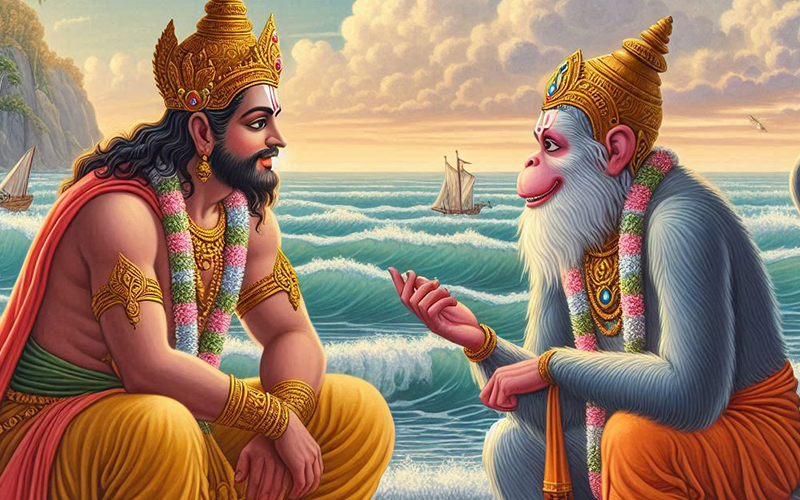Physical Address
Empirical System, 105 First Floor Pitru Krupa, Opp. R.K. Desai College, Koparli Road, Vapi (Gujarat) 396 191
Physical Address
Empirical System, 105 First Floor Pitru Krupa, Opp. R.K. Desai College, Koparli Road, Vapi (Gujarat) 396 191

Arjuna, while on pilgrimage at Rameshwaram, with thoughts of Lord Rama in his mind, beheld the marvel of Setu—the bridge constructed by the army of Vanaras. As he gazed upon the famed Setu, doubts crept into his mind. If Shri Rama was truly such a remarkable archer, why did he rely on the Vanaras to build the bridge? He could have constructed it himself using his archery skills, building a bridge of arrows. Was Shri Rama really such a great archer, as Shri Krishna and grandsire Bhishma have always told me? Such were the doubts that arose in his mind, clouded by the ego that he was the best archer, as everyone said.
Nearby, in solitude at Gandhamadan, the mighty Hanuman, son of the wind god and eternal devotee of Lord Rama, meditated upon his beloved master. When Hanuman found Arjuna engaged in such thoughts, he appeared before him in the form of an ordinary, old Vanara and addressed him. He explained the challenges of building such a bridge. He said that the Vanara ancestors were huge-bodied and heavy. Transporting those countless, massive Vanaras across to Lanka on a bridge of arrows would have been no small feat. Surely, Lord Rama had considered all options before deciding on the construction of the Setu.
Hearing this, Arjuna became even more determined. Certainly, a good archer can construct a bridge that can withstand the weight of any number of creatures—what are Vanaras! If Shri Rama was such a great archer, he must have confidently performed that feat. Even I could do it, he thought, given the chance.
Hanuman, ever devoted to his master, could not bear to hear criticism of Lord Rama. He challenged Arjuna’s boast, asserting that no archer could construct a bridge capable of withstanding the weight of the Vanaras. An argument ensued, leading to a decisive challenge: Arjuna would construct a bridge of arrows, and if it could bear Hanuman’s weight, he would be declared victorious; otherwise, he would perish in a burning pyre.
In his arrogance, Arjuna swiftly built the bridge of arrows and invited Hanuman to test its strength. Chanting the names of Lord Rama, Hanuman merely placed his tail upon the bridge; it crumbled like sand. True to the challenge, Arjuna prepared to enter the pyre.
Just then, a Brahmana appeared, inquiring about the matter. The Brahmana was none other than Lord Krishna, who had come to save the life of his dear friend and devotee, Arjuna. In the form of the Brahmana, Krishna pointed out the lack of a witness to their agreement, rendering it invalid. He offered himself as the witness and instructed Arjuna to try again.
This time, remembering Krishna in his mind, Arjuna rebuilt the bridge. Hanuman climbed upon it, and to everyone’s amazement, nothing happened—the bridge sustained his weight. Then, all of a sudden, both Hanuman and Arjuna saw that the Brahmana had lent his support, silently sustaining the weight of Hanuman. Hanuman immediately recognized Lord Rama in the form of the Brahmana, and Arjuna realized it was Lord Krishna. Realizing the divine presence, both Hanuman and Arjuna bowed in reverence.
Krishna embraced Hanuman, expressing his gratitude for the countless services rendered during the mission of Lord Rama. He told him that he was deeply indebted for Hanuman’s service—a debt that could never be repaid. In that moment, the debt of gratitude was acknowledged, transcending time and Yugas.
In this way, Krishna met his beloved Hanuman and saved the life of another—Arjuna. In another telling, it is said that the second time Arjuna built the bridge, he did so by remembering Lord Krishna, while Hanuman was confident that he could break any bridge. Thus, it was the name of the Lord that prevailed both times.
Hanuman then promised to be Arjuna’s flag-bearer upon his chariot during the great war of the Mahabharata. Ultimately, it was the power of the divine names of Rama and Krishna that triumphed in both instances.